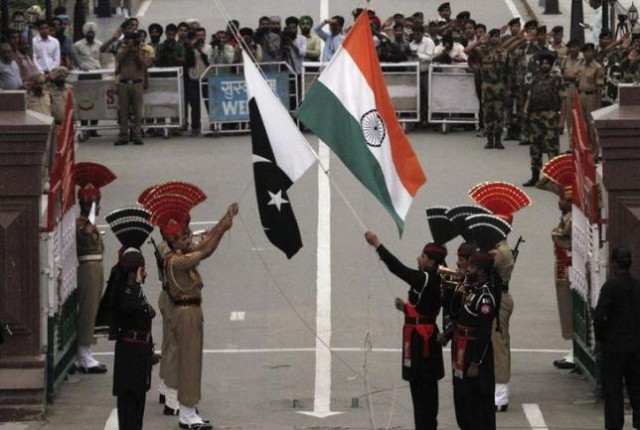Pakistan, India border chiefs agree to lower tensions in Kashmir
Heads of India's Border Security Force and the Pakistani Rangers met in New Delhi to find ways to de-escalate tensions

Pakistani rangers (wearing black uniforms) and Indian Border Security Force (BSF) officers lower their national flags during a daily parade at the Pakistan-India joint check-post at Wagah border, near Lahore November 3, 2014.
PHOTO: REUTERS
The heads of India's Border Security Force and the Pakistani Rangers met in New Delhi for a second day on Friday, to find ways to de-escalate tensions along the border as part of a series of measures agreed by the leaders of the two countries in July.
The border chiefs agreed to hold back cross-border firing and not to retaliate immediately to violations of a 15-year ceasefire, an Indian interior ministry official said.
Read: Border guards of India, Pakistan agree to end ceasefire violations
"Both have decided not to immediately retaliate against firing from either side and to contact the other side to know the cause of firing," the official said, reading from a draft text the two governments agreed.
Tens of thousands of soldiers are massed on either side of Kashmir, one of the world's most militarised regions, and in recent months they have stepped up cross-border firing.
Last month, at least nine people were killed by the firings on the day the nuclear-armed neighbours marked the 50th anniversary of a war between them.
Pakistan says India had violated the ceasefire over 70 times in two months.
India claims that Pakistani soldiers provide cover firing to help militants cross over and carry out attacks in its part of Kashmir.
Prime Minister Narendra Modi's government has promised a tougher response to such violations than previous administrations, and last year the two armies engaged in the most serious exchanges since the 2003 ceasefire.
Pakistan denies giving material support to the Kashmir militants, but blames India for refusing to hold talks to resolve the 68-year-old territorial dispute.
Modi cancelled top level talks between the national security advisers of the two countries last month, objecting to Pakistan's plan to meet Kashmiri separatists. But the two governments agreed to let the border chiefs meet.
The two forces will have greater communication to ensure things do not spiral out of control, the Indian official said.



















COMMENTS
Comments are moderated and generally will be posted if they are on-topic and not abusive.
For more information, please see our Comments FAQ